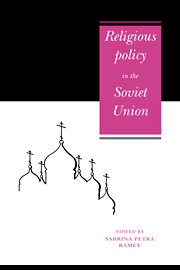Book contents
- Frontmatter
- Contents
- Notes on contributors
- Preface
- Part I Introduction
- Part II Policy apparatus
- Part III Education, socialisation, and values
- Part IV Cults and sects
- 10 Dilemmas of the spirit: religion and atheism in the Yakut-Sakha Republic
- 11 The spread of modern cults in the USSR
- Part V The world of Christianity
- APPENDIX: Religious groups numbering 2,000 or more, in the USSR
- Index
10 - Dilemmas of the spirit: religion and atheism in the Yakut-Sakha Republic
Published online by Cambridge University Press: 03 December 2009
- Frontmatter
- Contents
- Notes on contributors
- Preface
- Part I Introduction
- Part II Policy apparatus
- Part III Education, socialisation, and values
- Part IV Cults and sects
- 10 Dilemmas of the spirit: religion and atheism in the Yakut-Sakha Republic
- 11 The spread of modern cults in the USSR
- Part V The world of Christianity
- APPENDIX: Religious groups numbering 2,000 or more, in the USSR
- Index
Summary
In a magnificent pine grove on cliffs above the Lena River of Siberia, near where archeologists have found ancient pictographs of shamans (traditional medical and religious practitioners), it is still possible to join the poetic improvisational chanting accompanying ohuokhai, a Yakut-Sakha line dance. The beauty of the site brings out the spiritual in native hikers, who sometimes feel like expressing themselves in traditional ways. At the base of the cliffs stands a new serge, a sculptural pole that has become a symbol of Yakut-Sakha identity, marking connections to traditions, ancestors, and each other. Deeper in the taiga, are large imposing trees called al lukh mas, known as the hosts of ‘real spirit keepers of nature’, ichchi. They are presented with token offerings of coins and scarves by locals and visitors, who wish to preserve their personal sense of harmony and equilibrium with nature in the wake of modern ecological strife.
Many of those who dance and chant poetry in sacred groves, commemorate rituals with new versions of traditional sculptures, and make offerings to spirits of nature are literate, bilingual, and reflective people. Their participation in various Yakut-Sakha rituals and their belief in certain ancient religious ideas does not prevent them from functioning in today's rapidly changing post-Soviet political climate. Rather, expressions of religious feeling have themselves changed with the times. Each generation remakes traditions, consciously and unconsciously, with and without outside coercion.
During the ferment of the late 1980s throughout the Soviet republics, attitudes toward religion, faith, and spirituality changed as part of more general attempts to recover lost sovereignty.
- Type
- Chapter
- Information
- Religious Policy in the Soviet Union , pp. 231 - 251Publisher: Cambridge University PressPrint publication year: 1992
- 2
- Cited by

